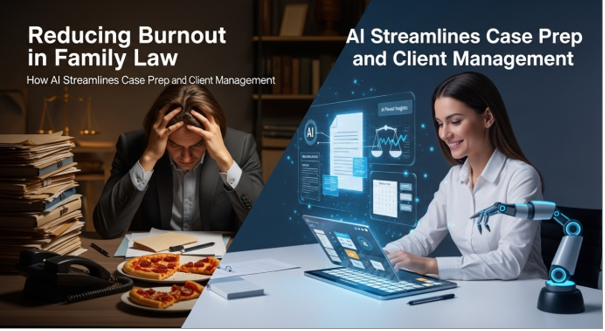Reducing Burnout in Family Law: How AI Streamlines Case Prep and Client Management

The Growing Challenge of Burnout in Family Law
Burnout in family law isn’t just common, it’s becoming a critical concern. The emotional toll of custody battles, divorce negotiations, and high-conflict clients often leads attorneys to feel drained, overworked, and disengaged. Add to that the heavy administrative load, tight deadlines, and court preparation, and it’s no surprise that many family law professionals are seeking ways to lighten their burden without compromising service quality.
This is where family law AI is stepping in—not as a replacement for human judgment, but as a tool to help lawyers do more with less stress. By streamlining case prep and client management, legal AI is helping reduce burnout across solo practices and midsize firms alike.
How Legal AI Reduces Time Spent on Case Preparation
One of the biggest drains on time and energy in family law is case prep. Traditionally, attorneys sift through case files, parse through legal documents, and review precedent manually. This can take hours, sometimes days.
Legal AI platforms are transforming that process. These tools can quickly scan and summarize case files, extract key information, and even recommend relevant precedents based on the case context. For example, in a high-conflict custody dispute, an AI tool trained on family law cases can pull up similar cases where certain custody arrangements were successful or contested—saving hours of research time.
Instead of spending entire days reviewing documents, lawyers can now focus on strategy, negotiation, and court prep. The result? Less fatigue, higher productivity, and more time for higher-level legal thinking.
Automating Client Communication Without Losing the Human Touch
Clients in family law are often navigating some of the most emotionally charged periods of their lives. They expect timely responses, reassurance, and clarity. While client care is essential, managing these communications manually contributes heavily to attorney burnout.
With family law AI tools, client communications can be streamlined while still feeling personal. AI-driven chatbots, for instance, can provide updates on case status, answer frequently asked questions, and collect basic case information—all without the lawyer having to respond to every message personally.
Some tools even allow you to set personalized response templates, so communications still reflect the tone and professionalism of your firm. For more complex queries, the system flags them for manual follow-up. This balance ensures clients feel heard and supported, while attorneys regain valuable time.
Simplifying Document Drafting and Filing
From motions to parenting plans, legal paperwork is a time-consuming aspect of family law. AI-powered drafting assistants can now help generate these documents based on templates and client-specific inputs. These tools can also auto-check for compliance with local rules and court formatting guidelines.
For example, if a client is going through a child custody modification, legal AI tools can generate a first draft of the required forms based on inputs like visitation schedule changes, income variations, and school district moves. The attorney only needs to review and tweak rather than build from scratch.
When these tools are integrated with e-filing systems, the process becomes even smoother. This level of automation cuts down the administrative workload dramatically.
Smart Scheduling and Case Management
Family law cases often involve coordinating schedules with multiple parties—clients, opposing counsel, courts, mediators, and sometimes even therapists or child specialists. Managing all of this manually can be overwhelming.
Modern legal AI systems now offer smart calendaring features that sync with your case management tools. These can help avoid double-bookings, send reminders, and even recommend optimal hearing dates based on court availability and attorney workload.
When used effectively, these tools reduce the stress of last-minute rescheduling and prevent small administrative errors that can have big consequences.
Enabling Better Work-Life Balance for Family Lawyers
The promise of family law AI isn’t just in its ability to speed things up—it’s about restoring balance. By eliminating repetitive tasks and helping lawyers focus on the parts of their work that truly require human insight, AI tools help reduce after-hours work, weekend catch-up sessions, and missed personal time.
Attorneys who implement legal AI solutions often report feeling more in control of their practice. They’re able to leave the office earlier, spend less time on burnout-inducing tasks, and more time doing the legal work they love—or enjoying well-earned downtime.
Making Legal AI Accessible to Small and Midsize Firms
There’s a misconception that only large firms can afford legal AI. The reality is that many family law AI tools are now designed for small and midsize practices. They’re cloud-based, scalable, and available through monthly subscriptions that fit most firm budgets.
Whether you’re a solo practitioner looking to reduce administrative overhead or a midsize firm aiming to increase client volume without overburdening your team, there are affordable tools to help. And because many of these platforms are tailored specifically for family law, the learning curve is minimal.
Ethical Considerations and Maintaining Client Trust
While family law AI can handle a wide range of tasks, lawyers must still uphold ethical and professional responsibilities. Clients need to know that their privacy is protected and that AI is being used to enhance—not replace—attorney involvement.
It’s important to choose AI tools that are transparent about how they use data, and that comply with legal industry regulations, including ABA guidelines. Communicating clearly with clients about how these tools help serve them better can also strengthen trust and satisfaction.
Conclusion
Reducing burnout in family law requires more than just cutting hours—it’s about working smarter. Legal AI helps lawyers regain control over their schedules, reduce emotional exhaustion, and provide better outcomes for clients. From automating prep work to simplifying client management, these tools are reshaping the way family law is practiced.
But success lies in using them thoughtfully. The human element—empathy, advocacy, and judgment—remains irreplaceable. When AI is used to free lawyers from the busywork, it allows them to focus on what truly matters: helping families navigate their most challenging moments with clarity and care.


